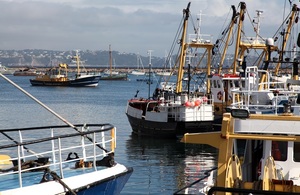E3 statement to the IAEA Board of Directors on NPT Safeguards Agreements with Iran, June 2021
Madam Chair,
France, Germany, and the United Kingdom would like to thank Director-General Grossi for his report on the implementation of safeguards in Iran, contained in GOV/2021/19, and DDG Aparo for the Technical Briefing on 2 June.
We fully support and commend the professional, independent and impartial verification conducted by the IAEA regarding Iran’s safeguards obligations, and the Agency’s efforts and interactions with Iran under its NPT Safeguards Agreement and Additional Protocol. We re-emphasise the importance of the IAEA continuing to evaluate all safeguards-relevant information available to it in line with standard practice.
We commend the Director General’s proactive and focussed efforts to engage in substantial technical discussions with Iran, in order to clarify safeguards issues that have been outstanding for over two years now.
In June 2020, this Board adopted a resolution echoing the strong concern expressed by the Director General on Iran’s lack of substantive engagement to clarify Agency questions related to possible undeclared nuclear material and nuclear related activities in Iran. The resolution called on Iran to fully cooperate with the Agency and satisfy the Agency’s requests without any further delay. One year later, this call has been unanswered despite ample time and opportunity for Iran to do so.
The questions asked by the Agency to Iran relate to the presence of nuclear material in several locations in Iran today. This is therefore a live issue relating to the completeness and correctness of Iran’s safeguards declarations and not merely “historical research”. In that respect, it is deeply concerning that in the absence of a credible explanation from Iran, the IAEA finds that undeclared nuclear material has been present at undeclared locations in Iran and that the current locations of this material are not known to the Agency. Iran’s lack of co-operation, together with the absence of application of the Additional Protocol, affects the ability of the IAEA to provide assurances of the exclusively peaceful nature of Iran’s nuclear programme.
We call on Iran to co-operate fully with the IAEA and provide all information and clarification deemed necessary by the Secretariat without further delay. It is only through Iran’s full co-operation that the Director General can resolve these outstanding safeguards questions and remove this issue from the Board agenda.
We have also taken note with deep concern of Iran’s decision to stop the implementation of modified Code 3.1 of the Subsidiary Arrangements to Iran’s Safeguards Agreement as of February 23. As expressed by the Director General, in his report to this Board, and previously affirmed by the Board and the United Nations Security Council, the implementation of modified Code 3.1 is a legal obligation under the Comprehensive Safeguards Agreement. We recall that implementation of the modified Code 3.1 cannot be changed or stopped unilaterally. In refusing to fully co-operate with the IAEA, Iran also undermines the integrity of the global safeguards system.
It is right that this Board keeps the very serious and significant issues addressed today under active review.
We encourage the Director General to continue reporting to the Board of Governors, as appropriate, and would welcome making report GOV/2021/29 public.
Thank you.
